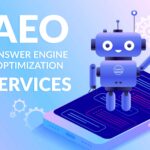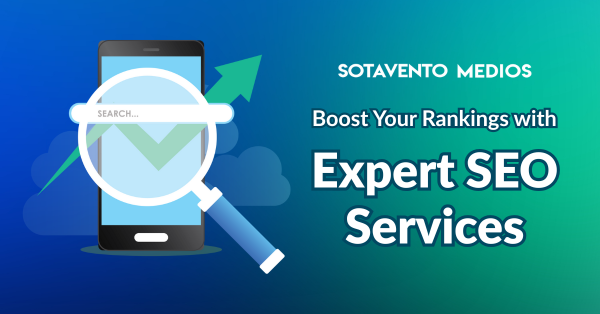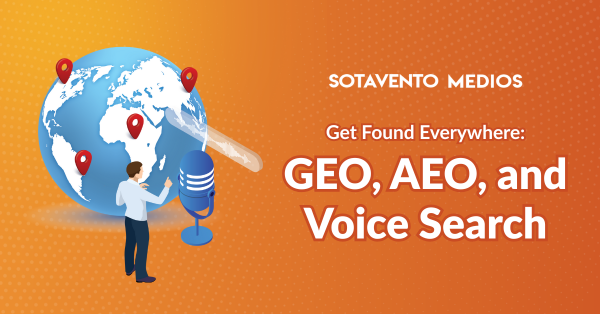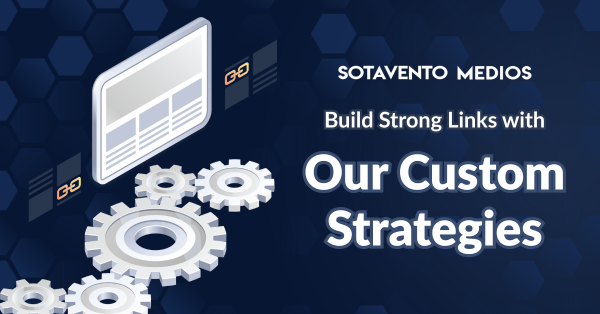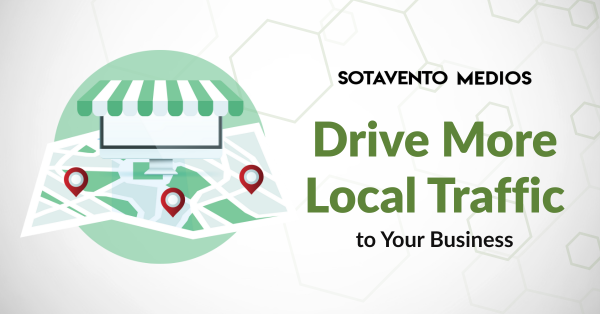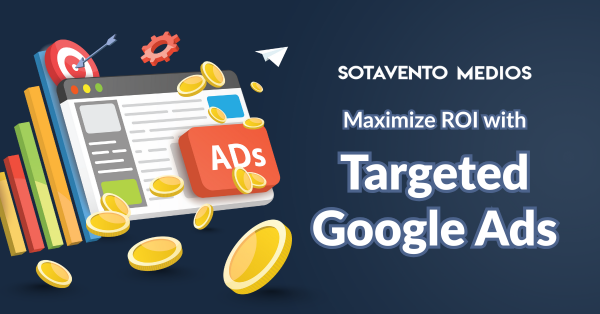The foundation of B2B digital strategy has changed. For more than twenty years, the goal of technical SEO was clear: rank well, drive clicks, and capture traffic. Success was measured by sessions, CTRs, and organic position reports.
Today, the digital landscape, dominated by Generative AI and Answer Engines like Google’s AI Overviews, Perplexity, and ChatGPT, requires a new approach. A staggering 60-65% of Google searches now end without clicks, and decision-makers increasingly depend on direct answers from AI tools to shorten the research phase of the buying cycle.
This change presents a crucial strategic question for marketing managers and technical SEO specialists: When should you optimize content for website clicks (SEO), and when should you focus on gaining an authoritative citation in AI-generated answers (Answer Engine Optimization, or AEO)?
The answer is no longer a simple yes or no. It is a layered process. Sotavento Medios’ position is clear: to keep B2B visibility in the AI-first era, you must shift from a Click-Capture mindset to an Answer-Authority framework.
Defining the Technical Divide: Clicks vs. Citations
To implement an effective hybrid strategy, we first need to differentiate between the two disciplines.
The SEO Objective: Click-Capture & Deep Funnel Engagement
Traditional Search Engine Optimization (SEO) remains essential for online visibility. Its main goal is to convince a search engine crawler, like Googlebot, that your page is the most relevant and authoritative source for a query. This results in a high ranking (e.g., a “blue link”) and a click to your website.
| Technical Focus | Primary Metrics | B2B Value Proposition |
| Crawlability & Indexing | Organic Sessions, CTR, Keyword Rank | Builds broad top-of-funnel reach (Awareness) |
| Long-Form, In-Depth Content | Time on Page, Conversion Rate (Leads) | Establishes domain authority (E-E-A-T) |
| Backlinks & Page Speed | Keyword Ranking, Technical Health Score | Drives deep product research and conversions |
SEO is the engine for discovery and trust-building on your domain. It’s vital for B2B topics that need thorough exploration and detailed data.
The AEO Objective: Citation-Authority & Zero-Click Answers
Answer Engine Optimization (AEO) involves structuring content so that AI-powered systems can easily extract, interpret, and cite your insights directly in their responses. The main goal is not to get a click but to establish your brand as the trusted source for a concise answer.
| Technical Focus | Primary Metrics | B2B Value Proposition |
| Structured Data (Schema) | Featured Snippet Capture Rate, AI Citation Frequency | Establishes immediate authority (Trust/Expertise) |
| Concise, Fact-Focused Answers | Brand Mention Frequency, Zero-Click Prominence | Captures users in the compressed research phase |
| Entity Recognition & Q&A Structure | AI Referral Traffic (High Conversion Intent) | Dominates high-intent, conversational queries |
AEO is crucial for delivering immediate credibility off your domain—where users are already finding answers.
Strategic Prioritization: When to Choose Which
The shift in B2B search behavior requires you to realign your content priorities based on user intent and where they are in the buying cycle.
Prioritize Clicks (Traditional SEO) When the Intent is:
- Commercial/Transactional: Queries show a clear intent to evaluate, compare, or buy (e.g., “Best CRM software for mid-market B2B,” “Service X pricing vs. Competitor Y”).
- Tactic: Invest in long-form, data-rich comparison guides and clear product pages. Optimize for core web vitals and focus on conversion calls to action.
- Deep Dive Research: Topics needing a thorough understanding, unique methodology, or extensive technical details (e.g., “Implementing a zero-trust architecture guide,” “Proprietary method for calculating ROI in B2B SaaS”).
- Tactic: Ensure content is over 1,500 words, uses relevant keyword clusters, and supports strong E-E-A-T signals like author bios, peer reviews, and external validation.
- Branded Search: Queries where users search for your brand (e.g., “Sotavento Medios contact,” “Client success stories for [Your Company]”).
- Tactic: Keep your homepage and service structure technically sound.
Prioritize Citations (AEO) When the Intent is:
- Informational/Definitional: Queries looking for quick, factual, or step-by-step answers. This is ideal for zero-click visibility (e.g., “What is generative engine optimization,” “How to implement FAQ schema”).
- Tactic: Provide value upfront by placing the most direct answer at the beginning. Use FAQPage and HowTo schema markup extensively on appropriate pages.
- Conversational or Voice Search: Queries phrased naturally, typically using words like “Who,” “What,” “Where,” “When,” “Why,” or “How” (e.g., “Tell me about the biggest trend in B2B SEO this year.”).
- Tactic: Phrase H2/H3 headings as questions, followed by a single, clear answer, making it easy for AI to reference.
- Authority Building: Content intended to position your brand as a trusted source on a specific fact or statistic (e.g., “Stat on zero-click search growth 2025”).
- Tactic: Use clear, labeled data points (e.g., in HTML tables), provide inline source citations, and ensure your content includes authority-building language.
The Technical Implementation Layer: A Hybrid Content Model
The best strategy in 2025 involves not choosing between SEO and AEO, but building a Hybrid Content Model where AEO is layered onto a solid SEO foundation.
1. The Structured Data Imperative
This is a critical step for AEO. You need to directly communicate the factual nature of your content to AI systems.
- Mandatory Schema: Use FAQPage, HowTo, and Article schema on relevant content pieces. For B2B, Organization Schema is essential for Entity Recognition, clearly defining your firm and its expertise.
- Proprietary Data Markup: If possible, use data or fact schema types to mark original research or key statistics you want AI to cite.
2. Content Modularity and “Fact Cards”
AI models do not read entire pages; they read passages. Every key insight on your page should be self-contained and easily extractable.
- Direct Answers First: The initial 100-200 words under any major heading should contain a direct answer to the implied question.
- Use of HTML Elements: Utilize bullet points, numbered lists, and HTML tables to showcase structured facts, specifications, and pros/cons lists. These “Fact Cards” are easy to extract and cite.
3. E-E-A-T Beyond Blue Links
The rise of Generative AI has made Experience, Expertise, Authority, and Trust (E-E-A-T) even more important. AI systems aim to base their answers on content from trusted sources.
- Technical Author Attribution: Use Article or Person schema to clearly credit the author’s credentials.
- Citation Building: While traditional backlinks improve SEO rank, actively seeking off-site citations and mentions in trusted industry publications, forums (like Reddit, which Google considers), and expert roundups enhances AEO authority.
Final Verdict: The B2B Strategic Imperative
The future of visibility depends on a multi-modal strategy: SEO is the entry point, while AEO provides the competitive advantage.
For B2B marketing managers, the priority matrix is clear:
- Core SEO investment (Clicks) should focus on commercial, bottom-of-funnel content.
- Aggressive AEO optimization (Citations) should target high-volume factual and definition-based questions.
Do not see the rise of zero-click search as a threat to traffic, but as an opportunity for authority. The brand often cited by AI as the definitive source will gain long-term trust, and ultimately, the conversion, even if the initial encounter occurs off-site.
This requires a technical audit that goes beyond page rank to evaluate Answer Readiness. Are your facts extractable? Is your expertise clear to the machine?
Sotavento Medios B2B CTA
The structure of your website needs to evolve to capture both clicks and citations. Are you sure your existing content is set up to be the main source for a Google AI Overview or a conversational AI response?
Contact Sotavento Medios today for a custom Answer Readiness Audit and strategic roadmap designed to secure your brand authority in the Generative AI search environment.




